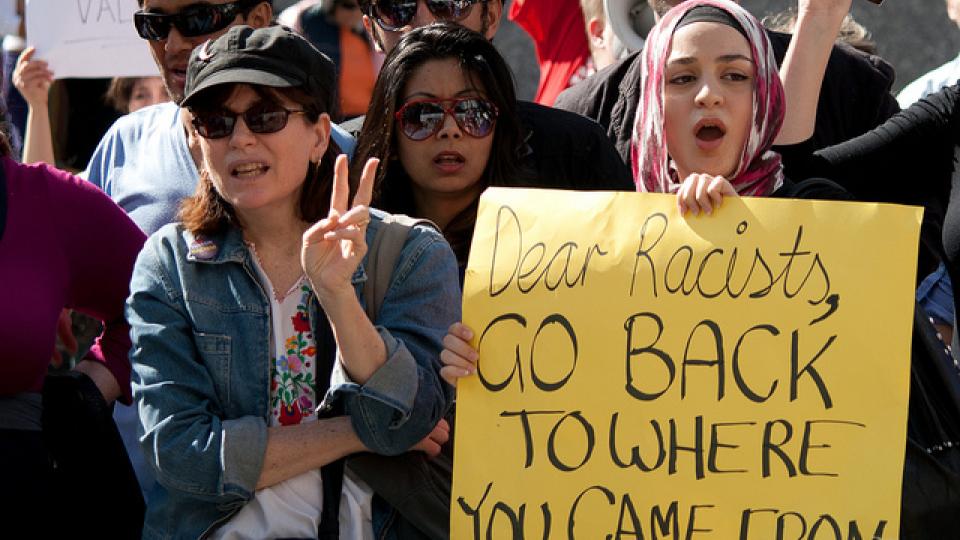Building the anti racism campaign

Reclaim Australia (RA) is arguably the most significant attempt to build a far-right movement in Australia since the early days of Pauline Hanson's One Nation party almost 20 years ago.
RA has organised a number of protests targeting mosque developments and Muslim communities. These have attracted some support, but have generally been matched or outnumbered by anti racist mobilisations.
Reclaim Australia and the neo-fascist groups within it such as the United Patriots Front (UPF) have been emboldened, in part, by the neoliberal attacks by successive governments (both ALP and LNP).
The impacts of neo-liberalism, including rising unemployment (up to 25% in areas like Broadmeadows), the crisis in housing; cuts to social services and attacks on workers' rights, provide fertile ground for the far right to organise, if left unchallenged by the progressive movement.
An increase in “official" racism via attacks on Aboriginal communities, refugees and migrants, combined with the "war on terror" has given confidence to RA to seek to organise.
One factor limiting the ability of groups like RA to gain a foothold has been a growing level of support for the rights of refugees and against Aboriginal community closures. Recent refugee and Aboriginal rights protests have attracted hundreds and in many cases thousands of people. Public opinion opposing the government's treatment of refugees and asylum-seekers has also grown.
Another factor is that while RA tries to distance itself from its neo-fascist affiliates, neo-Nazi insignia are worn openly by protesters at their rallies. In addition, while RA like to promote themselves as average "mums and dads" in the media, on a number of occasions, weapons have been found on RA or UPF members on their way to protests.
Anti racist activists and organisations on the left have also been “outed” and attacked by RA/UPF members on social media. Intimidation and violent incidents have occurred, including a run-through by RA/UPF goons at Melbourne's 3CR studios and the Melbourne Anarchist Club. In Sydney, the Black Rose anarchist bookshop was targeted. In Melbourne, an anti-racist female activist was physically assaulted by a member of RA on the street.
These violent incidents are very concerning, but they also undermine RA's attempts to build legitimacy and support in the mainstream, despite sympathetic media coverage.
It is worth noting that in the aftermath of the recent terrorist attacks in Paris, RA has not experienced growth in attendance at their rallies.
However, RA members are attempting to make inroads within unions. Some union delegates have openly identified themselves as members of RA to other workers. There are reports that RA members have approached unions for support for their rallies, while at the same time anti racist groups have sought their support for counter protests. This has resulted in some unions refusing to endorse anti racist protests on the basis that they have members "on both sides".
On the positive side, there have been union speakers at anti Reclaim Australia rallies in Perth, Sydney and elsewhere. The ETU Qld and Northern Territory branches recently produced an anti racism video aimed at educating ETU members, called "Stand Up Against Racism", and the CFMEU has produced an anti racism t-shirt.
Our approach
Socialist Alliance's approach to countering racism and the rise of the far right is as follows:
- We need to resist the official racism of “mainstream” Liberal and Labor governments. The more success that governments have with racist policies such as mandatory detention of refugees and attacks on Aboriginal rights, the more fertile will be the soil in which far-right movements can grow. By contrast, the more we can beat back these policies, the harder it will be for the far right to gain traction.
- Equally, the specific arguments and mobilisations of the far right need to be answered. To adopt an attitude towards groups like RA of "ignore them and they will go away" would be a fatal mistake. Our response should include powerful counter-mobilisations when RA organises a public presence and other activities aiming to challenge the racist attacks by both governments and the far right.
- Such a movement should be broad, inclusive and democratically organised. It should aim to mobilise the largest numbers instead of seeing physical confrontations as the goal. It should be organised around concrete anti-racist demands and should seek to organise maximum unity of the anti-racist forces. As well as mobilising in the largest numbers, a key goal of the movement should be to politically counter the racist arguments of groups like RA. This movement could also organise to defend communities that come under attack from groups like RA.
- It is essential that this movement be built in the unions. Unions have a significant role to play in influencing and mobilising workers. RA also knows this, which is why they are seeking to make inroads into the labour movement. As socialists, we need to be arguing in our workplaces and union bodies for our unions to come out strongly against the threat that groups like RA pose.
Tactics
There are no permanent tactics in the movement against racism and against the far right. These should be determined according to the balance of forces and local conditions and factors (e.g. the role of police and the media and their tendency to protect the far right and attack the left; the fear felt by members of communities under attack in mobilising publicly; etc). In general, the tactics that are adopted should have the aim of building the movement, not demoralising or isolating it.
We disagree with some on the left who fetishise the tactic of physical confrontation with the far right, but this is not the same as adopting a pacifist attitude to the violence of the far right. We believe in the right to self-defence, and we also demand that the police defend our protests against attack and defend migrant communities from attacks by the far right.